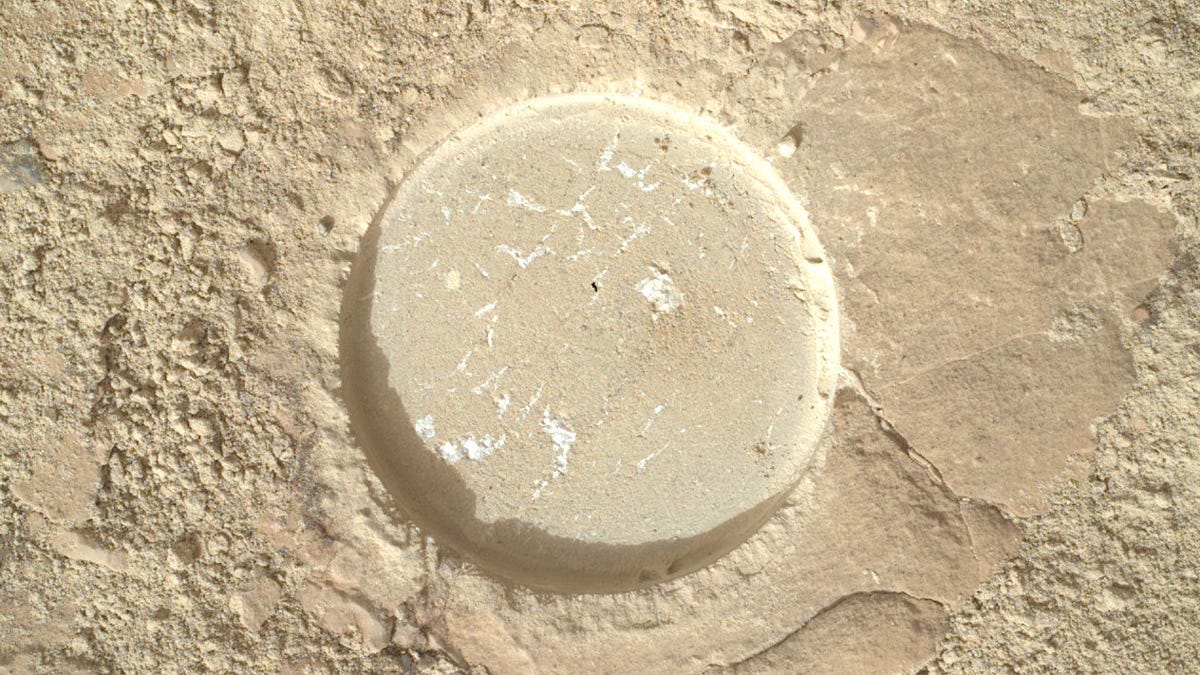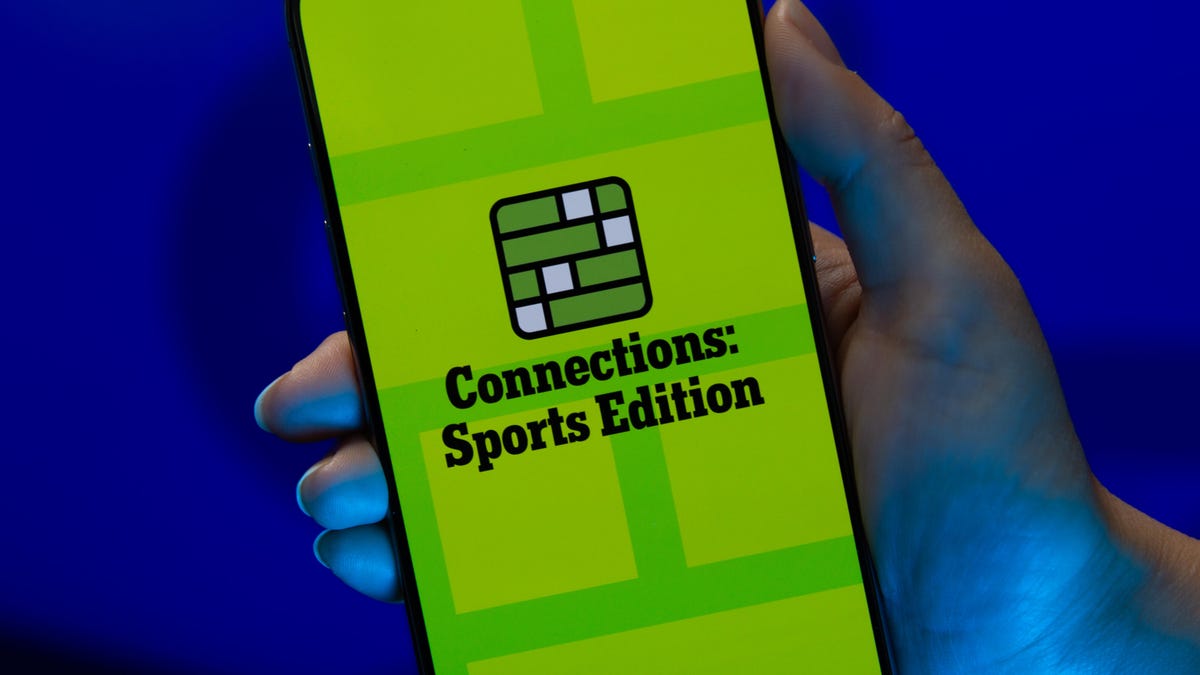Technologies
NASA Hopes Mars Rock Sample Might Contain Droplet of Ancient Water
Let’s get this Martian rock back to Earth and take a closer look.

This story is part of Welcome to Mars, our series exploring the red planet.
There’s a growing sense of excitement around NASA’s future Mars Sample Return mission, an effort to bring the Perseverance rover’s rock collection back to Earth. A new rock sample is adding to the anticipation because it might contain evidence of ancient water and (fingers crossed) long-ago microbial life — if it existed there.
The rock in question is now Perseverance’s 15th core sample. It’s named «Kukaklek» after a lake and river in Alaska. On Wednesday, the Perseverance team trumpeted the successful collection of the «nice piece of sandstone.»
Astrobiologist Erin Gibbons of McGill University offered more details on the rock in a rover update this week. Gibbons pointed out a set of thin, white veins visible in the sandstone after the rover abraded the surface away to get a look underneath. The veins are evidence of past water activity that filled small factures with mineral deposits.
NASA had previously talked up the sandstone rock prior to the rover gathering a sample, expressing hope that it might hold biosignatures, which the agency defines as «any characteristic, element, molecule, substance, or feature that can serve as evidence for ancient life.» Gibbons’ update highlights an even more specific dream of perhaps finding water hidden within.
NASA picked the Jezero Crater as the Perseverance rover’s landing site due to its intriguing history of water. It appears to be home to an ancient lake bed and river delta from a time long ago when Mars was wetter.
The rock was part of an outcrop named Hidden Harbor that likely formed back when Jezero was a lake. «This was an exciting find because the veins are strikingly different than the sedimentary rock surrounding them, suggesting that they formed at a different time and under different conditions,» said Gibbons. It’s like cracking open a tiny window into the Martian past.
The veins could hold hidden clues to Mars’ history of microbial life, if it was ever in residence there. «It is even possible that, during crystallization, the minerals in the veins trapped a droplet or two of the ancient water that carried them through the network of fractures in the first place, providing a time capsule of Mars’ watery past,» said Gibbons.
Miniscule fluid inclusions have been found in ancient Earth rocks. A study earlier this year described the discovery of microorganisms 830 million years old in fluid inclusions in halite crystals, raising the possibility that a similar find from Mars could preserve organic matter. «Do the veins in Jezero contain such fluid inclusions? It’s possible, but we cannot know for certain until we bring a sample back to Earth for detailed analysis,» Gibbons wrote.
The Mars Sample Return mission will be complicated and challenging, but necessary to truly understand Mars’ past and, hopefully, answer the question of whether the red planet was once home to microbial life.
Technologies
Today’s NYT Connections: Sports Edition Hints and Answers for Nov. 29, #432
Here are hints and the answers for the NYT Connections: Sports Edition puzzle for Nov. 29, No. 432.

Looking for the most recent regular Connections answers? Click here for today’s Connections hints, as well as our daily answers and hints for The New York Times Mini Crossword, Wordle and Strands puzzles.
It’s Rivalry Saturday, so Connections: Sports Edition gives a big game a nod with two caregories. If you’re struggling with today’s puzzle but still want to solve it, read on for hints and the answers.
Connections: Sports Edition is published by The Athletic, the subscription-based sports journalism site owned by The Times. It doesn’t appear in the NYT Games app, but it does in The Athletic’s own app. Or you can play it for free online.
Read more: NYT Connections: Sports Edition Puzzle Comes Out of Beta
Hints for today’s Connections: Sports Edition groups
Here are four hints for the groupings in today’s Connections: Sports Edition puzzle, ranked from the easiest yellow group to the tough (and sometimes bizarre) purple group.
Yellow group hint: Fire it on in there.
Green group hint: Buckeyes.
Blue group hint: Wolverines.
Purple group hint: Not double.
Answers for today’s Connections: Sports Edition groups
Yellow group: Baseball pitching feats.
Green group: Associated with Ohio State.
Blue group: Associated with Michigan.
Purple group: Triple ____.
Read more: Wordle Cheat Sheet: Here Are the Most Popular Letters Used in English Words
What are today’s Connections: Sports Edition answers?
The yellow words in today’s Connections
The theme is baseball pitching feats. The four answers are immaculate inning, no-hitter, perfect game and shutout.
The green words in today’s Connections
The theme is associated with Ohio State. The four answers are dotting the I, gray, scarlet and The Horseshoe.
The blue words in today’s Connections
The theme is associated with Michigan. The four answers are blue, Hail to the Victors, maize and The Big House.
The purple words in today’s Connections
The theme is triple ____. The four answers are A, crown, double and play.
Technologies
Today’s NYT Mini Crossword Answers for Saturday, Nov. 29
Here are the answers for The New York Times Mini Crossword for Nov. 29.

Looking for the most recent Mini Crossword answer? Click here for today’s Mini Crossword hints, as well as our daily answers and hints for The New York Times Wordle, Strands, Connections and Connections: Sports Edition puzzles.
Need some help with today’s Mini Crossword? It’s Saturday, so it’s a long one. Read on for all the answers. And if you could use some hints and guidance for daily solving, check out our Mini Crossword tips.
If you’re looking for today’s Wordle, Connections, Connections: Sports Edition and Strands answers, you can visit CNET’s NYT puzzle hints page.
Read more: Tips and Tricks for Solving The New York Times Mini Crossword
Let’s get to those Mini Crossword clues and answers.
Mini across clues and answers
1A clue: Hockey disks
Answer: PUCKS
6A clue: Signature headwear for Mr. Monopoly
Answer: TOPHAT
7A clue: Seedy establishment?
Answer: NURSERY
8A clue: Bioweapon at the center of a 2001 envelope scare
Answer: ANTHRAX
9A clue: Cleverly skillful
Answer: ADROIT
10A clue: Sleeping enclosure for a pet dog
Answer: CRATE
11A clue: Picks up the tab
Answer: PAYS
Mini down clues and answers
1D clue: Play, as a film character
Answer: PORTRAY
2D clue: Ultimate consequences
Answer: UPSHOTS
3D clue: Sweetheart, in French
Answer: CHERIE
4D clue: 24-___ gold
Answer: KARAT
5D clue: River in which Achilles was dipped (except for his heel!)
Answer: STYX
6D clue: Frozen landscape
Answer: TUNDRA
7D clue: Civil rights org. co-founded by W.E.B. Du Bois
Answer: NAACP
Don’t miss any of our unbiased tech content and lab-based reviews. Add CNET as a preferred Google source.
Technologies
Repair Your Electronics at Home With This Rare Black Friday Discount on the iFixit Pro Tech Go Toolkit
This toolkit rarely goes on sale, so take advantage of this opportunity to snag it for only $40.

While Black Friday is an excellent time to replace old smartphones or broken laptops at a discount, not everyone is looking to splurge on new tech right now. If you’re shopping on a budget, or simply like the devices that you have and aren’t ready for an upgrade, investing in an electronics repair kit may be a wise option. We’ve spotted a discount on the iFixit Pro Tech Go tech toolkit, bringing its price down to just $40. But don’t delay, Black Friday is in its final hours and this kit rarely goes on sale.
The iFixit Pro Tech Go kit can be used to open up and repair a wide range of electronics, including smartphones, laptops, gaming consoles, and smart home devices for DIY repairs like battery or screen replacements. The kit has a 32-bit Moray driver kit, an opening tool, a suction handle, a jimmy, a spudger and angled tweezer to carefully open your devices.
Don’t miss any of our unbiased tech content and lab-based reviews. Add CNET as a preferred Google source.
Repairing your own tech can save you hundreds or even thousands of dollars. It also reduces e-waste by helping your devices last longer rather than throwing them away over minor issue. As of this year, all 50 states have introduced right-to-repair legislation designed to give people a legal right to fix their own tech, and several states have already signed it into law.
You can check out more deals from iFixIt now on Amazon. Plus, for other budget buys, check out our roundup of the best Black Friday deals under $100.
MOBILE DEALS OF THE WEEK
-
$749 (save $250)
-
$475 (save $175)
-
$499 (save $300)
-
$900 (save $400)
Why this deal matters
This is a record low price on a repair kit that rarely goes on sale. While we did see a modest discount on the iFixit Pro Tech Go toolkit during Amazon Prime Day in July, it was not marked down for October Prime Day or other sales such as Memorial Day or Labor Day. As such, it’s fairly unlikely that we’ll see it go on sale again this season, so this might be your last chance to get the toolkit for only $40.
Join Our Daily Deals Text Group!
Get hand-picked deals from CNET shopping experts straight to your phone.
By signing up, you confirm you are 16+ and agree to receive recurring marketing messages at the phone number provided. Consent is not a condition of purchase. Reply STOP to unsubscribe. Msg & data rates may apply. View our Privacy Policy and Terms of Use.
-

 Technologies3 года ago
Technologies3 года agoTech Companies Need to Be Held Accountable for Security, Experts Say
-

 Technologies3 года ago
Technologies3 года agoBest Handheld Game Console in 2023
-

 Technologies3 года ago
Technologies3 года agoTighten Up Your VR Game With the Best Head Straps for Quest 2
-

 Technologies4 года ago
Technologies4 года agoBlack Friday 2021: The best deals on TVs, headphones, kitchenware, and more
-

 Technologies4 года ago
Technologies4 года agoVerum, Wickr and Threema: next generation secured messengers
-

 Technologies4 года ago
Technologies4 года agoGoogle to require vaccinations as Silicon Valley rethinks return-to-office policies
-

 Technologies4 года ago
Technologies4 года agoOlivia Harlan Dekker for Verum Messenger
-

 Technologies4 года ago
Technologies4 года agoiPhone 13 event: How to watch Apple’s big announcement tomorrow
